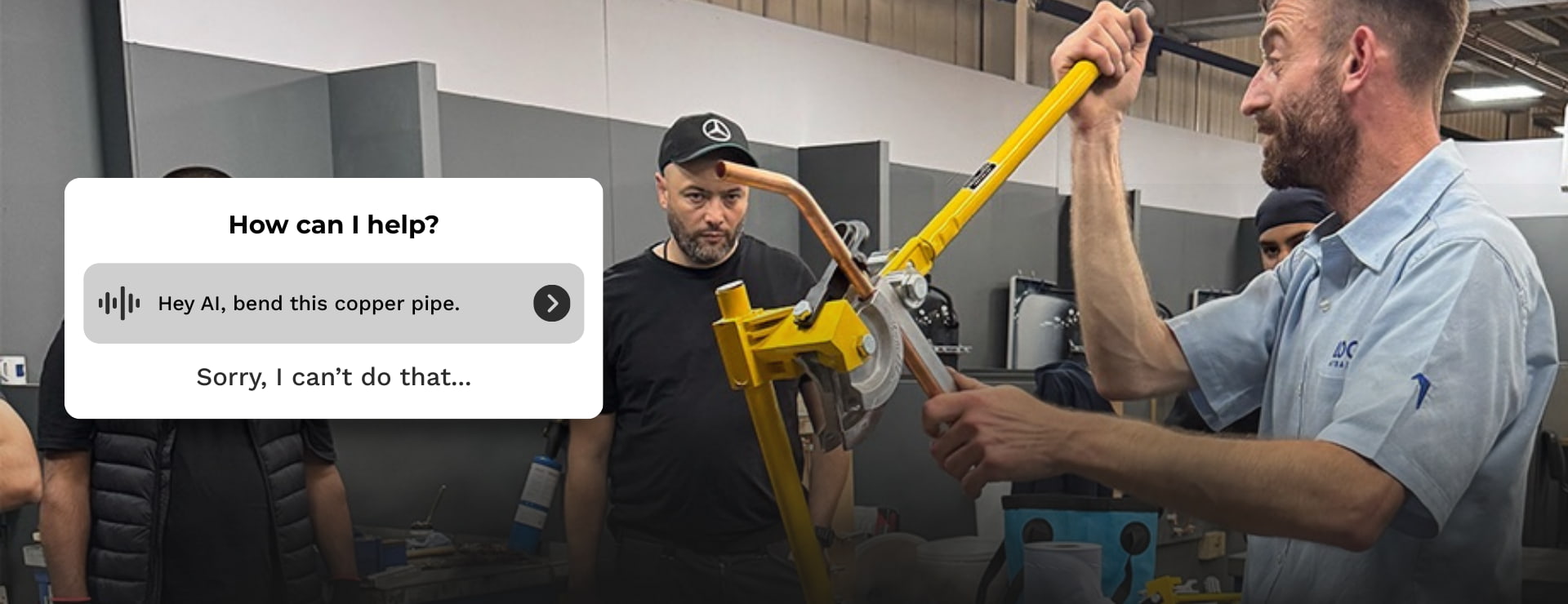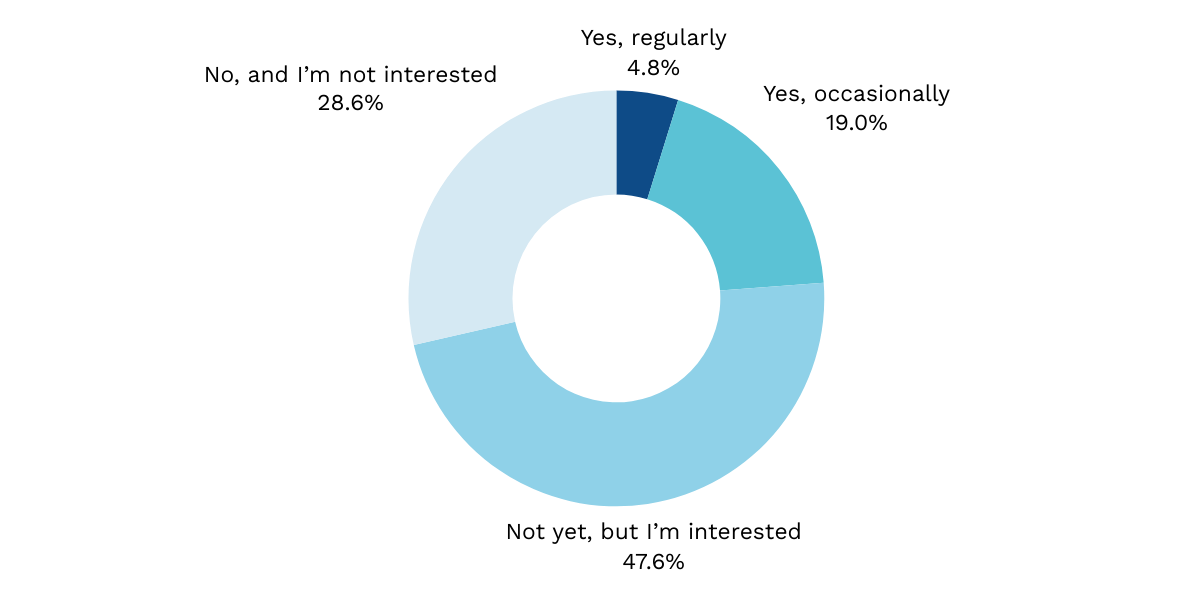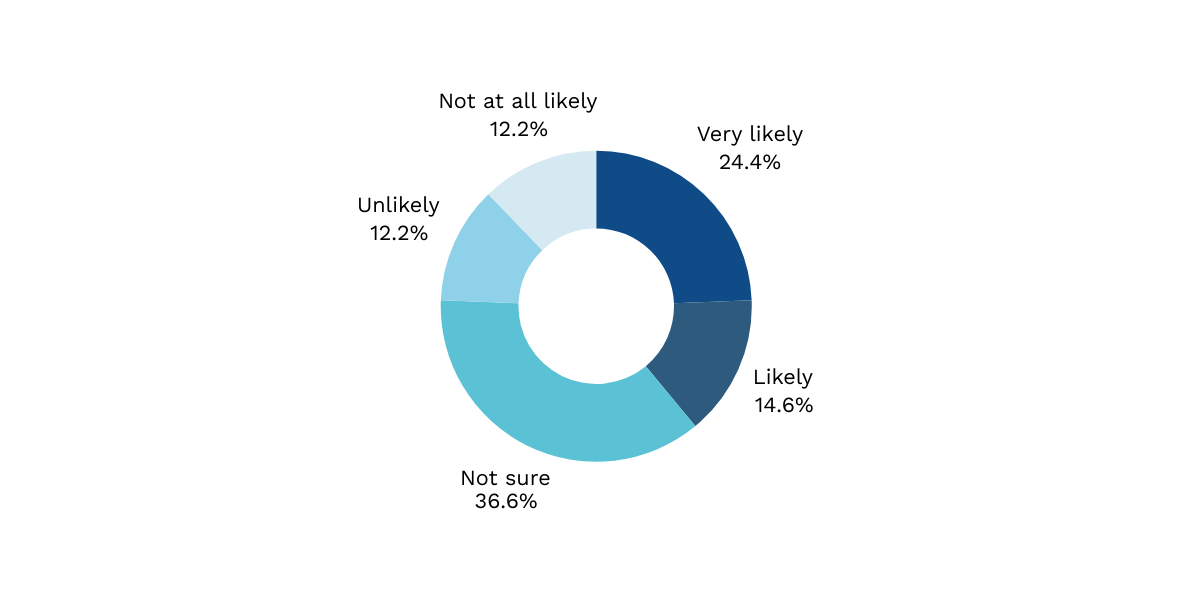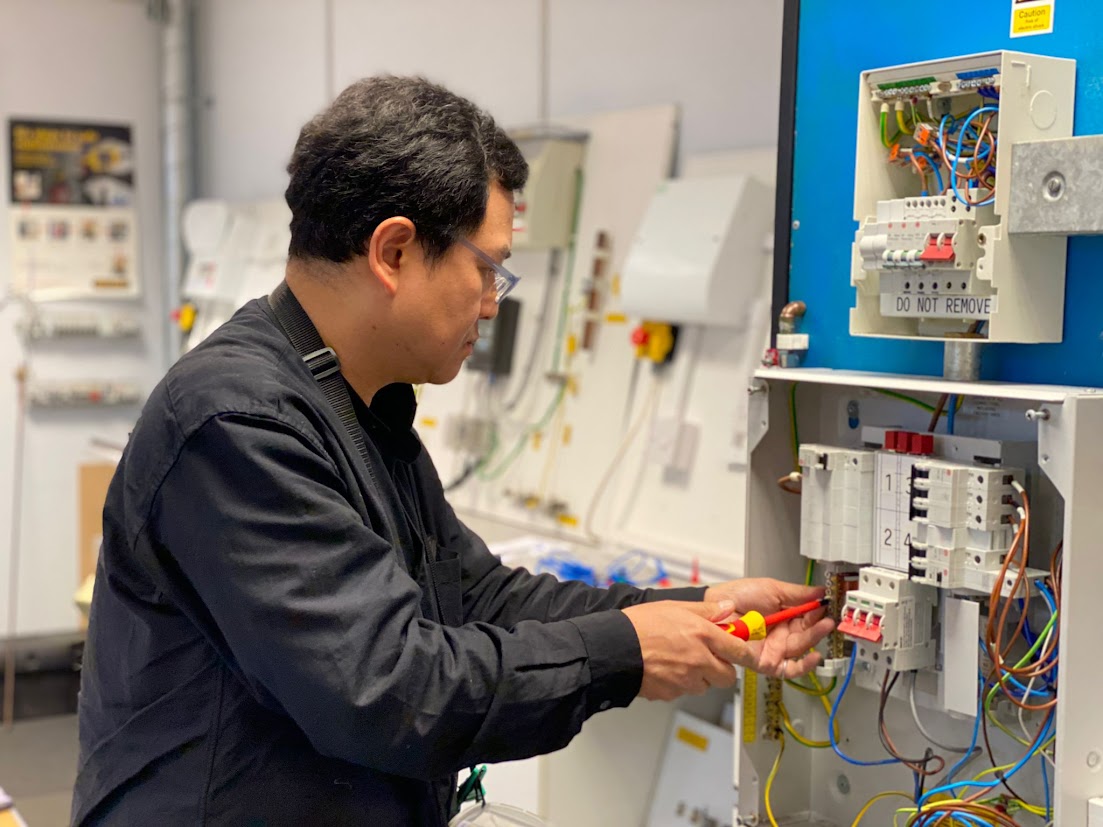AI is transforming the UK trades sector, from plumbing and gas engineering to electrics and property maintenance, yet many professionals are unsure about it's impact and practical benefits. At Logic4training, we ran a survey to ask our candidates how they are adopting, perceiving, and preparing for AI, offering actionable insights and trustworthy guidance for those keen to understand and navigate the future of AI in trades.

Survey Insights: Knowledge, Attitudes & Experience
Analysing responses from plumbers, gas engineers, electricians, and property maintenance professionals who have trained with Logic4training reveals several clear themes:
- 47.6% of the tradespeople that were surveyed are “somewhat familiar” with AI, and 33.3% have only “heard the term AI”. Only 11.9% of the respondents considered themselves familiar with AI and actively follow developments in the AI industry.
- Many tradespeople have limited direct experience with AI. Only 4.8% of the surveyed tradespeople actively use AI tools in their work, typically for design, diagnostics, or admin tasks.
- There is a strong interest in learning more, with most workers believing AI will bring “somewhat positive” or “neutral” impacts to the industry
AI is rapidly transforming how plumbers, electricians, gas engineers, and property maintenance professionals approach their daily work. As automation, diagnostics, and intelligent software become more accessible, trade workers are faced with new possibilities for improving efficiency, customer service, and job safety. Most of the survey respondents expressed curiosity about AI, but a significant number remain cautious or only somewhat familiar with its actual capabilities.
Who is Using AI Tools Already?
A small subset (4.8%) of respondents regularly use AI-powered tools, such as digital diagnostic platforms, rendering software for design, or even document formation utilities like GPT-based programmes.
- These users report tangible benefits in accuracy, speed, and customer communications.
- AI adoption is most common among those with an active interest in technology or several years of experience.
Survey question: Have you ever used AI tools in your work?

What Do Tradespeople Want From AI?
Tradespeople across the UK trades sector are increasingly recognising the potential benefits that AI can bring to their work. Survey responses reveal that the majority see AI as a tool for driving efficiency, improving the quality of their output, and boosting profitability, even if adoption rates are still developing.
Survey question: Which of these benefits do you think AI could bring to the trades?
This question allowed users to choose multiple options.

Survey responses show that most tradespeople expect AI to deliver these top benefits:
- Better job accuracy & diagnostics: Over half of respondents believe AI will help identify improved fault finding and diagnostic support as a major benefit.
- Time savings on admin tasks: Half of the respondents believe AI will help reduce paperwork and streamline administrative work.
- Enhanced customer experience: Faster communication, clearer information, and smarter service are valued by a significant number.
- Improved safety: Many see AI helping to identify hazards, validate safety steps, and support safer practices, especially in gas and electrics.
- Increased profits: Tradespeople often cite higher profits through efficiency and reduced errors.
Only a small minority reported “none of the above” or said they lacked enough knowledge to comment, showing strong overall interest across most benefits.
The survey makes it clear that most professionals are positive about AI’s potential impact, expecting it to play a significant role in streamlining admin, reducing errors, and enhancing safety and customer satisfaction. These benefits form a strong foundation for the future, making AI an attractive area for further exploration and upskilling across all trade disciplines.
When considering where AI could be most useful, tradespeople have clear preferences. The survey data demonstrates high demand for AI to tackle the most time-consuming and error-prone tasks in daily operations, with diagnostics, fault finding, and administrative automation topping the list.
Survey question: If you could use AI for one part of your work, what would it be?

Tradespeople overwhelmingly want AI to assist with diagnostics and fault finding, making complex troubleshooting, testing, and system analysis much faster and more accurate. This is the area where most respondents see immediate practical benefit, as it allows them to spend less time tracking down faults and more time delivering quality work. Improved diagnostics directly support compliance, safety, and customer satisfaction and can be considered three pillars of modern trades; therefore, anyone working in the trades would benefit from improving these aspects.
Admin and paperwork are the next most requested applications for AI. Completing forms, generating invoices, preparing quotes, and keeping diaries all add up to countless hours of manual effort each month. By automating these tasks, trades professionals gain precious time back, lowering their stress levels and increasing efficiency. For many, reducing admin is seen as “taking the pain out of work” so they can focus on skilled tasks.
There is also strong interest in design and innovation support through AI-powered drawing, layout, and technical planning tools. Tradespeople who handle installations or complex projects want smarter visualisation and design software, which improves both technical accuracy and communication with clients.
Customer communication is valued as a future benefit as well, with survey respondents anticipating faster, clearer answers to queries and smarter ways to share regulatory or technical information. This not only boosts professionalism but can also enhance client relationships with more transparency and faster responses.
A notable number of respondents see the future of AI in trades as an “all aspects” solution, expecting it to play a role in everything from compliance and materials management to innovation and problem-solving. While some professionals remain uncertain or feel they lack enough knowledge to specify applications, the dominant theme is clear: AI should be harnessed for the areas that are most time-intensive and subject to error, freeing up tradespeople to excel in the practical work that defines their craft.
Tradespeople’s Concerns About AI
There is notable anxiety around job losses, over-reliance on technology, and the high cost of specialised AI tools. Data privacy and trust issues, both from workers and their customers, also present barriers.
Survey question: Which of these concerns do you have about AI in the trades?
This question allowed users to choose multiple options.

Trades professionals are most concerned about over-reliance on technology and its potential impact on the very nature of skilled work. Many fear that using AI systems extensively could undermine the traditional expertise and hands-on problem-solving which have long defined excellence in the trades sector. There’s a concern that embracing automation too quickly might sacrifice the “personal touch” that clients expect from skilled tradespeople, eroding trust and professional identity.
Closely linked is the concern about the high cost of tools and software needed for AI adoption. Investing in advanced platforms and ongoing licensing or subscription fees can be a significant outlay, particularly for small businesses and self-employed engineers. For many, these costs must be carefully weighed against expected benefits and savings, and some are simply delaying adoption until more affordable solutions, or clearer ROI, become available.
Data privacy and security are the next major concerns tradespeople face. As AI platforms manage more sensitive customer and project data, the risks associated with breaches, leaks or unauthorised usage grow. Keeping up with evolving data protection regulations and ensuring clients’ information is kept secure adds further complexity and responsibility, often making professionals hesitant to fully integrate AI into their regular operations.
Beyond this, concerns about job losses and reduction in demand for skilled labour remain prominent. The possibility that systems and automation will replace manual skilled roles worries many, not just for practical reasons but because of the impact on pride, tradition and the value placed on professional skilled workers. The sector is united on the need to integrate AI as a supportive tool but never as a replacement for real expertise. We feel that the trades are one of the safest industries from AI job losses and have covered this topic in more detail in our AI Job Losses & Why Tradespeople Are Safe from AI blog.
Finally, there is a real apprehension about reduced customer trust. AI-led communication and impersonal automation may risk damaging the strong relationships that tradespeople have always built with their clients. Respondents point out that maintaining trust requires a balance: leveraging technology for efficiency, but always preserving the authentic, responsive service customers value most.
With these challenges in mind, we believe in a balanced approach that integrates AI as a complement to skilled work that is carried out by tradespeople, rather than a replacement. Our philosophy is clear. Technology enhances, but does not replace, skilled work.
Industry Attitudes Towards AI
Despite enthusiasm, tradespeople remain cautious about AI’s long-term impact. Many see advantages in safety, accuracy, and efficiency, but do not want to become over-reliant on the technology.
Survey question: Do you think AI will have a positive or negative impact on the trades industry overall, according to the survey?

The survey data shows that the majority of tradespeople think that AI will have a positive impact on the trades industry but they are aware that there are some concerns with this emerging technology.
These findings reflect a sector that is open to progress but determined to adopt technology in ways that truly support and enhance skilled practical work. Experienced professionals, particularly those with 15+ years in the industry, consistently stress the need for ongoing training and the importance of keeping core skills up to date as technology evolves.
Logic4training is committed to supporting tradespeople on this journey, offering regular skill updates and insightful content on topics such as AI, digital compliance, and practical guidance for integrating AI into real-world settings. This ensures that every professional can confidently balance innovation with the trusted standards that define the UK’s trades sector.
The Role of Training Providers
Training providers like ourselves play a role in shaping how the industry adapts to the challenges and opportunities presented by AI. As the trades industry changes, it’s not enough to simply teach traditional skills. Today’s tradespeople need training that merges practical expertise with digital proficiency. This means going beyond the basics of pipework, wiring, or installation and embedding digital literacy, critical thinking, and adaptability into every stage of learning.
A forward-thinking approach should include hands-on exposure to real AI tools and platforms that enable trainees to build practical competence and confidence with the AI platforms they’ll encounter on the job. Modules can demonstrate how AI streamlines admin, supports rapid fault-finding, and enhances design and allow learners to see the tangible benefits alongside best practices for troubleshooting and manual work.
It is also essential that training covers the ethical dimensions of AI adoption, including data privacy, secure recordkeeping, inclusive design, and the social impact of automation on jobs. Open discussion, scenario-based problem-solving, and continuous professional development (CPD) opportunities will allow learners and employers alike to stay ahead of new developments, ask questions, and share experiences. By blending the latest in plumbing, gas, electrics, renewables, property maintenance, and compliance with up-to-date digital content, we ensure our candidates are not just work-ready but also ready for the future. In doing so, we maintain trust in professional standards, allowing tradespeople to thrive and support the sector’s long-term resilience.
Future Outlook
The outlook for AI in the trades sector is one of cautious optimism with a clear trend toward gradual adoption. Survey data indicates that while enthusiasm for AI’s potential remains strong, there is still a sizeable portion of the workforce that feels unsure about what the future holds.
Survey question: In the next 5 years, how likely are you to use AI in your work?
 Looking at the likelihood of AI adoption over the next five years, the data reveal a diverse landscape. This split of opinions reflects a sector that is open to innovation, but still weighs each new technology carefully against the realities of daily practice, regulatory shifts, and customer expectations. Respondents consistently stress that AI will only be widely adopted if it is practical, secure, and demonstrably beneficial. It’s not just a buzzword or passing trend.
Looking at the likelihood of AI adoption over the next five years, the data reveal a diverse landscape. This split of opinions reflects a sector that is open to innovation, but still weighs each new technology carefully against the realities of daily practice, regulatory shifts, and customer expectations. Respondents consistently stress that AI will only be widely adopted if it is practical, secure, and demonstrably beneficial. It’s not just a buzzword or passing trend.
Going forward, the industry can expect a gradual but steady increase in AI integration, especially as trust grows, concerns and barriers are addressed, and more tradespeople experience the real-world advantages of these tools. For training providers and employers, the task is clear. Continue supporting upskilling, open discussions about AI’s benefits and risks, and provide resources that keep both experienced professionals and newcomers future-ready.
At Logic4training, we see AI being integrated into most industries over the next couple of years, but the trades will adapt and integrate at a slower rate than other industries. Because of the practical nature of the industry, we believe that tradespeople will experience the integration of AI the least when compared to other industries. Industries that require people to be sitting at a desk, working on a computer, will see a quicker rate of AI adoption. While tradespeople will adopt and use AI within their day-to-day jobs, it won’t lead to job displacement and job losses, unlike in other industries. Just think. Can AI replace a toilet, install a new boiler or wire a house? No. That requires tradespeople who have experience in the real-world working environments, as well as dexterity and fine motor skills. Compare this to web development. Can AI code? Yes. Check out Replit. Granted, it’s not yet as good as an experienced web developer, but it’s already close to that level.
As the sector continues to evolve, it’s vital to remember that successful AI integration means harnessing digital innovation without losing sight of the practical skills that underpin the industry. Tradespeople will increasingly draw on AI for efficiency, troubleshooting, admin and compliance, but the core of the job, whether fixing a leak, wiring a home, or tuning a heating system, require a skilled, reliable, and human touch. This hybrid future presents an exciting opportunity: with the right training and guidance, the UK’s trades sector can continue to thrive, embracing new technology while proudly preserving the values and standards that have always set it apart.
AI job losses & future-proofing
FAQs
What is the main benefit of AI in the trades?
The key advantage of AI in the trades is the significant reduction of manual admin work and improved accuracy in diagnosis and problem-solving. AI-driven tools can analyse complex fault data, automate paperwork, and streamline scheduling, all of which help reduce human error, free up time for on-the-job tasks, and enable professionals to deliver faster, more reliable service to customers. This translates into higher productivity, less time spent on repetitive admin, and increased profitability for both sole traders and larger firms.
Are tradespeople worried about job losses from AI?
Job displacement is a widespread concern, particularly as automation advances in other industries. However, most tradespeople believe that AI should enhance rather than replace skilled labour. The sector values experience, practical ability, and the human touch, which AI cannot replicate. Although some workers fear that simpler tasks may become automated, the consensus is that core trade jobs, those requiring hands-on skills, dexterity, and on-site decision-making, will remain safe.
Is AI being used widely in UK trades yet?
As it stands, AI adoption in UK trades remains relatively limited, but uptake is increasing. Only a small proportion of professionals use AI-powered tools daily, such as for diagnostic testing and digital record-keeping, but many more are experimenting with new apps and platforms. The overall trend is towards growing curiosity, with more firms trialling AI for tasks like quoting, compliance, and customer communications.
Should trades training include AI skills?
Absolutely. Training should cover practical digital literacy, use of AI tools relevant to each trade, and ethical guidance on issues like data privacy and responsible tech use. By merging training with modules on AI, diagnostics, compliance, and automation, training providers can help tradespeople stay employable, adaptable, and confident as the sector evolves.
Where do tradespeople see AI being most useful?
Most tradespeople expect AI to deliver the greatest value in diagnostics and fault finding, followed by automating time-consuming admin tasks (such as invoicing, scheduling, and report writing). Others are interested in AI for customer communications, materials tracking, and compliance management.









